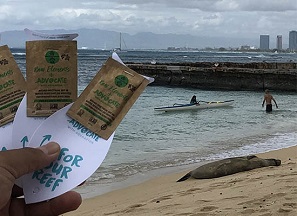
Earlier this year, Napili Kai Beach Resort, located on one of Maui’s most beautiful reef-protected bays, introduced an educational program to encourage visitors to use reef-safe sunscreens. In recent years, coral reefs throughout Hawaii and the world have shown damage and bleaching due to a variety of environmental factors, including poisoning from chemical sunscreen. Many common sunscreen ingredients can lower reef tolerance to bleaching and interrupt the development of marine life, including the coral itself, which is a living organism. Beginning in mid-December, Napili Kai began welcoming arriving guests with a free sample packet of Raw Elements reef-safe sunscreen, along with a discount coupon to purchase more and information about the damaging effects of chemical sunscreen on the reef ecosystem.
Aqua-Aston Hospitality, one of Hawaii’s largest hotel and resort condo management companies, launched its reef-safe sunscreen initiative, #ForOurReef, on Earth Day in 2017. Since then, Aqua-Aston Hospitality has distributed more than 22,000 sunscreen samples with education throughout the local Hawaii community, and sponsored key events and endeavors led by the Bishop Museum and Waikiki Aquarium.
Committed to protecting Hawaii’s coral reefs and ocean sustainability, Aqua-Aston Hospitality is providing information and access to quality sunscreen to make it easier for its more than five million guests a year to choose sunscreen that’s free from oxybenzone by installing complimentary reef-safe sunscreen dispensers and offering reef-safe sunscreen for sale at hotels and resorts. This month, it also rolled out a complimentary Eco-Kit amenity for guests who book directly. Currently available at 16 properties throughout the state, the management group aims to implement the program across all its 40+ Hawaii-based properties, including those on the U.S. Mainland and Costa Rica, by the end of 2018.







